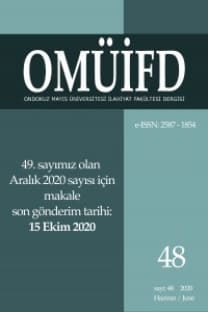İslâm Hukuk Metodolojisinde İstishâb
Sözlükte “beraberlik” ve “beraberliğin devam etmesi” anlamlarına gelen istishâb, terim olarak önceden var olan bir şeyin varlığının devam etmesi, yok olan bir şeyin de yokluğunun devam etmesi anlamında kullanılmıştır. İstishâb birtakım aklî ve naklî delillerle desteklenmiştir. Naklî delillerin başında istishabın kural olarak kullanıldığı ayet ve hadisleri görmekteyiz. Bu da istishabın geçerli delil olduğunu ispatlamaya yeter gözükmektedir. İstishâb delillerin en sonuncusudur. Başka bir deyişle, istishâba ancak başka bir delil bulunmadığı zaman başvurulur. Bu yüzden, istishâb zayıf bir delil olarak görülmüştür. İslam hukuk mezheplerinden her biri - değişik açılardan itirazda bulunmuş olsalar bile – çeşitli oranlarda istishâbı bir delil olarak kullanmışlardır. İstishâb İslam Hukukunun ibadetler, muâmelât, ceza, medeni hukuk,...vb. hemen hemen tüm alanlarında delil olarak kullanılmaktadır. Ayrıca istishâb, modern hukukta da önemli ölçüde yer almış bulunmaktadır. Denebilir ki, istishabın “kanunsuz suç ve ceza olamayacağı” ve “beraat-i zimmetin asıl olduğu” ilkeleri ceza hukuku alanında, “eşyada asıl olanın mübah olduğu” başka bir ifadeyle “kanunlarla,… vb. yasaklanmayan her şeyin serbest olduğu” ilkesi de evrensel ilkeler arasındadır. Ayrıca istishâb, “şek ile yakînin zâil olamayacağı” ilkesiyle fakihlere hüküm ve fetva verirken karşılaşacakları tereddütlü durumlar açısından bir genişlik ve rahatlama sağlamakta, meseleleri kolayca ve süratli bir şekilde çözmelerine yardımcı olmaktadır. Şu beş ilke istishab kuralından türetilmiştir: 1- "Şek ile yakîn zâil olmaz." 2- "Bir şeyin bulunduğu hal üzere kalması asıldır." 3- "Eşyada asıl olan mübah olmaktır." 4- "Beraet-i zimmet asıldır." 5- "Sıfat-ı ârızada asıl olan ademdir."
Anahtar Kelimeler:
-
Istıshâb In The Methodology Of Islamıc Law
Istishâb in dictionary form is “cooperation” and “the continuation of cooperation”, as a term is used as “things in existence to continue existing, things that are nonexistent to continue not to exist”. Istishâb has been supported by both mental and traditional evidence. At the beginning of traditional evidence we can see that as a rule of istishâb from verses of the Quran and traditions (hadiths). This is enough to show that istishâb is valid evidence. Istishâb is the last of all evidence, in other words istishâb is used when there is no other evidence to turn to. So it is the weakest one. Each one of the sects of Islamic law - even if they were objectives from different views - have used istishâb as evidence in different proportions. Istishâb is used as evidence in all fields of Islamic law, for example worships, muâmelât, penalty, civilized laws etc. In addition istishâb takes an important place in the foundation of modern law. It can be said that in istishâb “there isn’t any illegal crime and punishment”, “ the real principle is that everyone is not guilty” – in penalty law- and “the real principle in everything is free to happen” these principles are also within the universal principles. Furthermore, istishâb helps jurisprudents with “certain knowledge wont be lost by suspicion” principle when giving rule and opinion (fatwa). This help will give them wideness and comfort when they are hesitated. These five principles have come across from istishâb 1) certain knowledge wont be lost by suspicion 2) the real principle in everything is to continue it’s existence 3) the real principle in everything is free to happen 4) the real principle is that everyone is not guilty 5) the real principle in temporary position is that not to exist.
Keywords:
-,
- Yayın Aralığı: Yılda 2 Sayı
- Başlangıç: 1986
- Yayıncı: ONDOKUZ MAYIS ÜNİVERSİTESİ
Sayıdaki Diğer Makaleler
Alişah B. Hacı Büke Evbehî ve Mûsikî Nazariyatçılığı
İslam Hukuku Açısından Satış Sözleşmelerinde Mülkiyetin Devrine Yönelik Engeller
Dinin Gerekliliği ve Dinde Değişim Süreci
İbrahimî Dinlerdeki Müşterek Dinî Pratiklerin Yorumlanması Sorunu
Hadis Verilerine Göre Hz.Peygamber’in İlk Kıblesi: Beyt-İ Makdis
İnsanın Egzistansiyal İhtiyaçları ve Dinin Perenniyal Cevapları
Hegel’in Zihin Fenomenolojisi’nde “Arzu” (Desire) Kavramı Üzerine Bazı Düşünceler
“Sadaka” Kavramının Kur’an’daki Anlam Çerçevesi -Semantik Bir Tahlil Denemesi-
